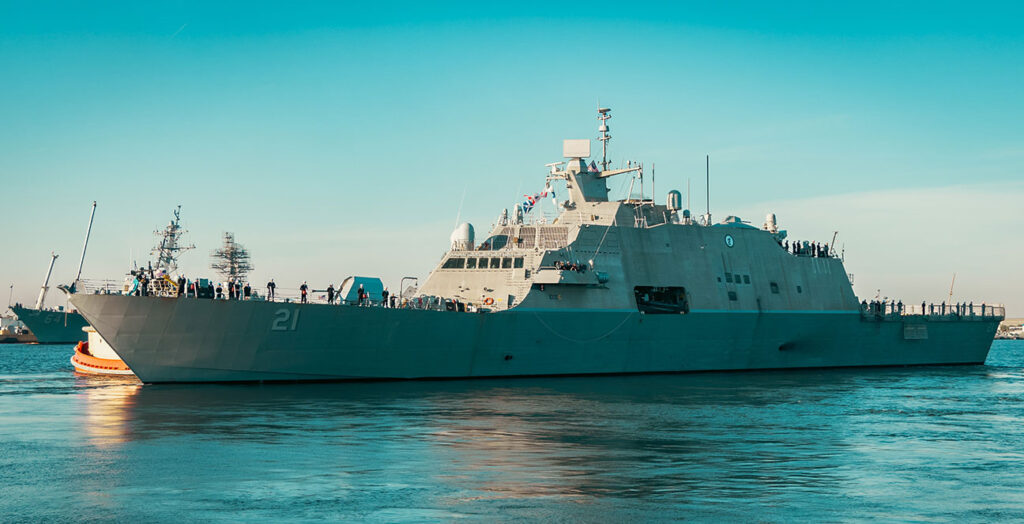The Freedom-class littoral combat ship USS Minneapolis-St. Paul departs Naval Station Mayport in Jacksonville, Florida, for her maiden deployment on March 26, 2025. The ship deployed to the U.S. 4th Fleet’s area of operations to support counter-illicit drug trafficking operations. PETTY OFFICER 1ST CLASS BRANDON J. VINSON/U.S. NAVY
THE WATCH STAFF
The littoral combat ship (LCS) has found its calling. The USS Minneapolis-St. Paul, a Freedom-variant LCS on its maiden deployment, halted two alleged drug smuggling operations in the Caribbean Sea within 72 hours. The feat showed once again that the LCS are well suited to terminating drug smuggling schemes.
The Minneapolis-St. Paul, accompanied by a U.S. Coast Guard Law Enforcement Detachment and Helicopter Maritime Strike Squadron 50, Detachment 3, interdicted vessels in two separate actions through a combination of air and surface operations. The combined forces helped the Minneapolis-St. Paul seize about 580 kilograms of cocaine worth more than $9.4 million and 1,125 kilograms of marijuana, worth about $2.8 million, a U.S. Navy news release said April 17.
“The USS Minneapolis-St. Paul executed their duties seamlessly in the combined effort to protect the homeland from illicit maritime trafficking,” said Rear Adm. Carlos Sardiello, commander of U.S. Naval Forces Southern Command/U.S. 4th Fleet. “Working in coordination with the Coast Guard and our joint partners, we look forward to seeing continued measurable impact delivered by the professional and talented crew of the USS Minneapolis-St. Paul across the region.”
The successful operations are among several in recent years in which an LCS made huge drug busts. In December 2020, the USS Gabrielle Giffords intercepted a “low-profile vessel” in the eastern Pacific Ocean that was carrying $106 million worth of cocaine. In September 2021, the USS Sioux City seized more than $20 million worth of cocaine in the Caribbean Sea.
The LCS is “almost perfectly made” for operations against drug smugglers, said Brian Persons, a senior management scientist with the Rand Corp. and former executive director of Naval Sea Systems Command and deputy chief of naval operations for warfare systems. “Eventually, these ships, they find their place and niche in the warfighting world,” he told Task & Purpose, a military news website.
Each LCS, designed for near-shore operations, is fast, can house two SH-60 or MH-60 Seahawk helicopters, and is packed with air- and surface-search radar. Those capabilities make them great at busting drug smugglers, who usually use fast boats or low-profile vessels — sometimes rudimentary submersibles. The LCS also carries missiles, which don’t have much practical value in drug interdictions.
The LCS is probably the best ship for anti-drug smuggling missions, Persons told Task & Purpose. He said destroyers and cruisers are much larger and more costly ships designed for “high-end” combat. “They could do it, but the Littoral Combat Ship system would be a better employment of assets for the U.S. Navy,” Persons said.
The Minneapolis-St. Paul will be assigned to the U.S. 4th Fleet. Its home port is Mayport, Florida, and it will be assigned to Littoral Combat Ship Squadron 2. “To be able to make an immediate impact so early on during our maiden deployment is a testament to the hard work and skills of the ship’s crew.” Minneapolis-St. Paul commanding officer Cmdr. Steven Fresse said after the drug interdictions.

